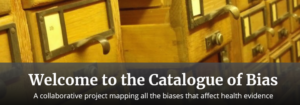 The Centre for Evidence Based Medicine at the University of Oxford has developed a catalogue of sources of bias that may affect health care evidence, and may need to be taken into account when performing a critical appraisal on a published piece of research.
The Centre for Evidence Based Medicine at the University of Oxford has developed a catalogue of sources of bias that may affect health care evidence, and may need to be taken into account when performing a critical appraisal on a published piece of research.
Just a few of the examples include:
Allocation bias
Systematic difference in how participants are assigned to treatment and comparison groups in a clinical trial.
Hot stuff bias
When a topic is fashionable (‘hot’) investigators may be less critical in their approach to their research, and investigators and editors may not be able to resist the temptation to publish the results.
Positive results bias
The tendency to submit, accept and publish positive results rather than non-significant or negative results.
Volunteer bias
Participants volunteering to take part in a study intrinsically have different characteristics from the general population of interest.
For more information, including ways to reduce possible bias when carrying out research, visit the Catalogue of Bias.
